
Albers Brief Fall 2017
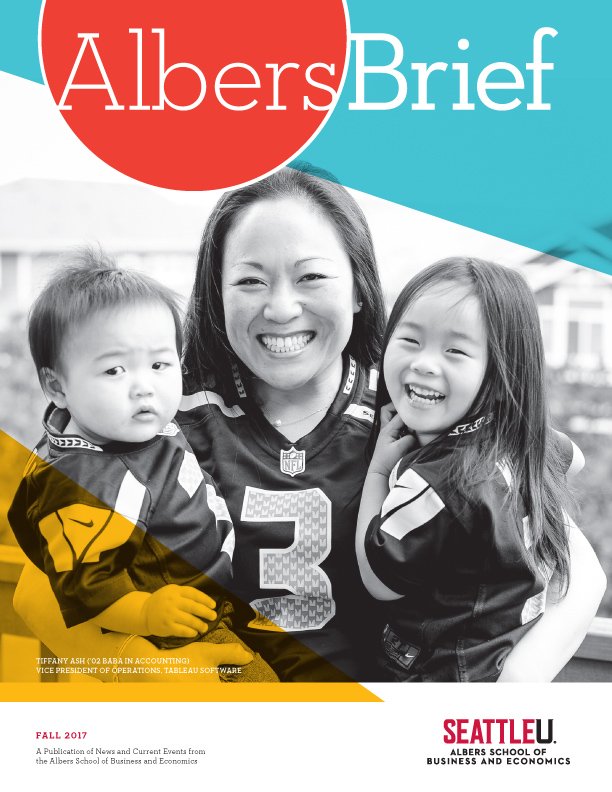
DEAN'S MESSAGE
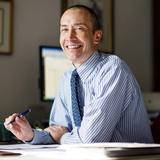
As the school year begins, we are putting the finishing touches on our 2017-2020 Strategic Plan. There are three Concentration Areas in our plan. The first is to Deliver exceptional value to the Seattle Business Community. This entails making sure that our academic programs are aligned to graduate students who will be highly successful professionals and meet the needs of employers. An example of this would be our initiatives in Business Analytics, where on the heels of the very successful launch of our MS in Business Analytics degree, we are initiating an undergraduate concentration in Business Analytics (which you can read more about later in this Brief!). And don’t just take my word on the success of our new MS program — read the article about new alum Francis LasPinas to learn more!
Delivering exceptional value to the community also means continuing to strengthen ties with our alumni, particularly those in our region. The story in this edition of the Brief about alumna Tiffany Ash illustrates the success of our alumni and exemplifies why strong ties with alumni are so important to our success!
A second area of focus will be to Increase demand for an Albers education through leadership and innovation. This initiative will focus on developing on-line graduate degrees, identifying innovative practices that make our programs stand out, and sharpening our recruiting efforts for undergraduate transfer students and MBA students.
The final initiative to concentrate on will be to Strengthen the power of the Albers brand. A task force assigned to this effort will begin its work this fall. As illustrated throughout this Brief, our approach, commitment, and effectiveness in serving our students and the Seattle business community is distinct and powerful, and the taskforce will design ways for us to successfully communicate that!
Thank you to all who share your time, talent, and treasure with the Albers School. It is an essential ingredient to our success. Enjoy reading this edition of the Albers Brief!
STUDENT PROFILE: FRANCIS LASPINAS
USING BUSINESS AND SCIENCE TO ACHIEVE HIS GOAL
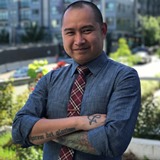
When Francis LasPinas started the Professional MBA (PMBA) program at Seattle University, he was “expecting school,” but it turned out to be much more than that. “Albers has been the gateway to all of my success,” he said. Coming in, he didn’t know about all the resources available to him, but once he found them, he took full advantage. "Albers made it easy to be successful. They ’create‘ successful,” he said. Not only has LasPinas been spending time in class and studying, but he has taken advantage of resume writing workshops, networking events, career fairs, and more. He has also discovered his interest in analytics, which led him to enroll in a second Master’s program, the new Master of Science in Business Analytics (MSBA). So, when he graduated in June 2017, he had earned two Master’s degrees—the PMBA and the MSBA.
Although he considers himself a “typical” student, LasPinas really isn’t. After all, it’s rare at Albers to see an environmental science major who focused on insects in our graduate programs. He spent a lot of time collecting insects and writing about their behavior — not exactly a clear path to pursuing a graduate degree in business. When considering career options, LasPinas realized that if he wanted to continue to study insects, he would need to get a PhD or take a low-paying position with limited opportunities. He was not ready to settle on either of those options.
LasPinas ended up spending the last ten years working in project management, first in construction and then in the healthcare field. He was a project manager for a pathology lab when he decided to pursue graduate studies, although he was unclear as to what kind of program he should enter. He didn’t see the sense in going further with environmental sciences. “I knew I was deficient in business skills and thought I would find more success if I had them,” he said. “It would make me more integral to a company.” After researching local MBA programs, LasPinas chose Seattle U because he felt more comfortable with the smaller class sizes, he had a positive experience at Jesuit institutions in high school and college (Santa Clara), and he found the experienced faculty who he met to be very personable. While he was concerned that an MBA was too general, LasPinas decided to move forward because “it was in my best interest to do it.” He was admittedly never as good a student as he should have been, but entering the MBA program, he remembered what his undergrad mentor said to him: “You are going to be a success, but nobody’s going to take you seriously if you don’t take yourself seriously.” He knew this was important advice and felt that doing graduate studies would be a way to show that he takes himself seriously.
LasPinas enjoyed the general education he received in the PMBA program and supplemented that with a certificate in Business Analytics. When he heard about the new MSBA program, it sparked his interest in diving deeper into that. After spending two years working full time and going to school, he had to convince his wife that adding on another year was the right thing to do. He is very happy he did, and has already seen results: he recently accepted a position as a clinical data analyst at MultiScale, a Providence Health-backed startup.
What’s next for LasPinas is still up in the air. “Getting a good job is easy now that I’ve done what I’ve done, but that’s not enough,” he said. He’s considering getting a PhD in health services or health economics. His goal is “to ensure that I can make the lives of other people better so they can do what they want and be fulfilled.”
ALBERS FACULTY RESEARCH NEWS
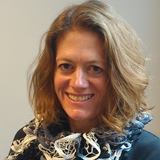
Bridget Hiedemann (Professor of Economics) and Erin Vernon (Assistant Professor of Economics), along with Bonnie Bowie (College of Nursing), have had their article, “Economic Evaluations of Thrombophilia Screening Prior to Prescribing Combined Oral Contraceptives: A Systematic and Critical Review,” accepted for publication in Applied Health Economics and Health Policy.
Bonnie Buchanan’s (Associate Professor of Finance) book, Securitization and the Global Economy: History and Prospects for the Future, has just been published by Palgrave Macmillan.
Cathy Cao’s (Associate Professor of Finance) paper, “Value of Employee Satisfaction During the Financial Crisis,” co-authored with Chongyang Chen (Pacific Lutheran University), has been published in Managerial Finance.
Katya Emm’s (Associate Professor of Finance) paper, “A Newcomer’s Guide through the Jungle of Capital Structure: The Case of Amazon.com,” has been accepted for publication in Advances in Financial Education. It is co-authored with Mishari Albusayyes (PMBA student) and Eric Wehrly (Western Washington University).
Holly Ferraro (Associate Professor of Management) and Jennifer Marrone (Associate Professor of Management) have had their case study, “Is this for me? Career Decision Making within Family Businesses,” accepted for publication in the Case Research Journal.
David Reid’s (Professor of Management) paper, “Absorptive Capacity and Innovation in China,” has been accepted for publication in the International Journal of Emerging Markets.
Claus Pörtner’s (Assistant Professor of Economics) paper, “Differences in Child Health across Rural, Urban, and Slum Areas: Evidence from India,” has been accepted for publication in Demography.
Bridget Hiedemann’s (Professor of Economics) paper, “Will You Still Want Me Tomorrow? The Dynamics of Families’ Long-Term Care Arrangements,” co-authored with Steven Stern (SUNY Stonybrook) and Michelle Sovinsky (University of Mannheim), has been accepted for publication in the Journal of Human Resources.
Sarah Bee (Senior Instructor in Accounting) and Dennis Applegate (Lecturer in Accounting) have had their paper, “Revisiting Internal Audit Internships,” coauthored with Dominique Vincent (chair of the Internal Audit advisory board), accepted for publication in Internal Auditor, the journal of the Internal Audit Institute.
Jessica Imanaka (Associate Professor of Business Ethics) and Greg Prussia (Professor of Management), along with Albers alumna, Samantha Aw, have had their paper, “Laudato Si’ and Integral Ecology: A Reconceptualization of Sustainability,” accepted for publication in the Journal of Management for Global Sustainability.
Marinilka Kimbro’s (Assistant Professor of Accounting) article, “Capital Planning, Selection, and Investment: Integrating Sustainability in Decision- Making,” co-authored with Eric Wehrly (Western Washington University), has been accepted for publication in the Journal of Management for Global Sustainability.
Sarah Bee’s (Senior Instructor in Accounting) paper, “The Lemonade Stand: An Elementary Case for Introducing Data Analytics,” co-authored with Brad Shafer (Kennesaw State University) and Peggy Garnsey (Siena College), won the Best Education Paper Award at the American Accounting Association’s Accounting Information System Section midyear meeting that took place January 19-21, 2017 in Orlando.
ALBERS STUDENTS ARE WINNERS!
CFA SOCIETY SEATTLE RESEARCH CHALLENGE
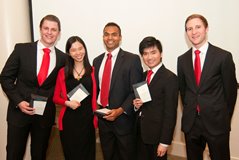
For the fifth time in eight years, an Albers team won the Seattle CFA (Certified Financial Analyst) Research Challenge and advanced to the America’s Regional competition. This is a record number of wins for the CFA Society Seattle local competition. Advised by Professor Katya Emm and mentored by Jamelah Leddy, CFA (Cohen & Steers), team members Qiuyu Huang, Drew Nordstrom, Avinash Ram, Justin Totura, and Enderson Wong successfully competed against teams from Pacific Lutheran University, University of Washington – Bothell, University of Washington – Computational Finance and Risk Management, University of Washington – Foster, and University of Puget Sound.
Each of the Seattle U team members won a Kindle loaded with classic investment books, including You Can Be a Stock Market Genius by Joel Greenblatt, The Intelligent Investor by Benjamin Graham, Berkshire Hathaway Letters to Shareholders, 1965-2014 by Warren Buffett, and One Up On Wall Street by Peter Lynch. The Albers team performed admirably at the Americas Regional, losing only to the eventual winner, Seton Hall University.
The CFA Research Challenge is an annual global competition that provides university students with intensive training in financial analysis and mentors to work with as they prepare a research report on a local publicly traded company. This year, the subject company for the Seattle competition was Costco Wholesale. The teams with the top three written reports, as judged by a panel of volunteer local investment professionals, prepare an oral presentation that is given in front of a panel of three local portfolio managers. The winners of the local competitions in the U.S. move on to compete in the Americas Regional competition, with the winners of that advancing to the Global Final.
KPMG CASE COMPETITION
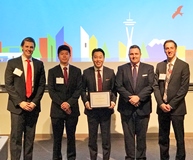
The Albers team of Zakary Kim, Trey Takara, Justin Totura, and Daniel Verburg won the 2017 KPMG Case Competition, beating out 11 other teams from universities in Washington, Oregon, Idaho, Montana, and Alaska. KPMG awarded a total of $5,000 in cash awards to students, including a $3,000 team award for 1st place. “Our own Redhawk team rocked the competition, drawing praise from KPMG judges and competing team faculty advisors as well,” said Jani Medeiros, senior administrative assistant in the Department of Accounting and coordinator of the event. Team faculty advisor Gabriel Saucedo agreed enthusiastically.
The KPMG Case Competition was created to challenge and inspire students, testing their ability to analyze and respond to realistic business scenarios. The 2017 case required students to analyze the adequacy and timing of a goodwill impairment following ASC 350-20 guidance. After four hours of preparation, each team presented its solution to a panel of KPMG judges from across the audit, advisory, and tax practices. The Northwest Regional competition has been hosted at Seattle University since its inception in 2008.
MORE SCHOLARSHIPS FOR ALBERS STUDENTS!

Thanks to a generous estate gift, Albers was able to establish the Mary Agnes and Raymond Guernsey Endowed Scholarship Fund. The gift of more than $2.3 million is the third largest ever received by the Albers School. We plan to use this scholarship funding to improve the diversity of our undergraduate programs and to assist enrolled undergraduate students with significant financial need. “Albers is very grateful to receive this gift from the Guernseys. These scholarship funds will give more students access to the transformative education provided by Seattle University and the Albers School,” said Joe Phillips, Albers dean.
Mary Agnes Guernsey passed away in September, 2015. Her husband, Ray, preceded her in death in 2006, and worked for PACCAR for most of his career. Mary Agnes was born in Seattle and was a life-long Seattle resident, active in Ballard’s St. Alphonsus parish. Although Mary Agnes’ will designated that the scholarship fund at the Albers School be named for her husband, it seemed only fitting to honor both Mary Agnes and Ray for this generous gift in support of Albers students with financial need.
NEW PROGRAM!
BUSINESS ANALYTICS CONCENTRATION
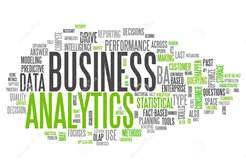
Following in the footsteps of the Graduate Certificate in Business Analytics and the Master of Science in Business Analytics (MSBA), Albers is launching an undergraduate concentration in Business Analytics in winter 2018.
The Business Analytics concentration is for students with an interest in identifying complex business problems in terms of analytical models, developing solutions that achieve stated objectives, and translating the results into recommendations for effective courses of action. Topics covered in the concentration include:
- Data visualization
- Data base management
- Statistical programming
- Data mining
- Machine learning
- Big data
- Applied problem solving
- Ethical and legal understanding of data analytics
ALBERS EXECUTIVE SPEAKER SERIES
DOYLE SIMONS, PRESIDENT &CEO, WEYERHAEUSER
Weyerhaeuser: Creating a winning company vision and culture
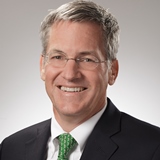
Becoming one of the world’s leading timber, land, and forest products companies is not an easy feat. Sustaining that level of excellence for 117 years is even more difficult. Doyle Simons took on that task when he became Weyerhaeuser’s CEO in 2013.
In order to maintain Weyerhaeuser’s competitive advantage in its industry, Simons determined from the start that the company needed a real vision, not just one that was on a plaque hanging on the wall. He spent his first 50 days as CEO out in the field meeting people and visiting the company’s facilities. He visited over 40 different sites across North America and had over 170 one-on-one meetings with employees of all levels in the company. In those meetings, Simons asked the same three questions: “What do we do well at Weyerhaeuser, what do we need to do better, and what do we need to do to make Weyerhaeuser a truly great company?”
Armed with the input he had gathered, Simons spent his next 50 days meeting with his senior management team and talking to customers and shareholders. Out of that came the new company vision:
Working together to be the world’s premier timber, land, and forest products company.
Weyerhaeuser works toward this vision through what it has defined as its core values, relentless focus areas, and key behaviors, and it measures its success by what it sees as being a truly great company:
- Great place to work
- Great financial results
- Great sustainable products
- Great commitment to community
Through the process of making its vision real, Simons, as well as the leadership at Weyerhaeuser, learned the following:
- Listen
- Make it action-oriented
- Keep it simple
- Communicate, communicate, communicate
BRANDON PEDERSEN, EVP FINANCE & CFO, ALASKA AIR GROUP
What Keeps Alaska Air Growing?
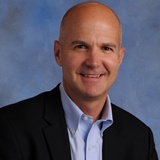
Alaska Air started as a simple airline in Alaska almost 85 years ago. It has grown into a major airline with a route map that goes north, south, east, and west. While it has a long record of growth, it has grown at an even faster rate over the last ten years and looks to continue this pattern with its acquisition of Virgin America in December of 2016, according to Brandon Pedersen, executive vice president of finance and CFO of Alaska Air Group. “Alaska has a lot of things going for it and all of that combined is the secret sauce that has allowed Alaska to grow,” he said. Pedersen attributed Alaska Air’s growth to six things:
- Great people
- A great operation
- Lower costs than its competitors
- Reasonably good capital allocation
- A great affinity card
- A growing network
With all this in place, Alaska needed to think about where it wanted to go in the future. One of the options was to expand into other big cities, but most of those were already occupied by other airlines at that point. It could have also added flight frequencies during the day or use larger planes, but that didn’t seem to be enough for them. After analyzing where it might find growth, Alaska identified California as the market providing the greatest opportunity. The next decision was whether to build or buy into it. In the end, buying Virgin America was identified as the best option. Virgin America owned about 60 planes and, similar to Alaska, had a loyal customer base and delivered award-winning service. Also enticing was the space Virgin America owned at the San Francisco airport and LAX. It had the geographic fit, the cultural fit, and the network opportunity.
Mergers are always difficult, but Pedersen is pleased with the results to date. “At the end of the day, I feel really good about our ability to continue to grow Alaska, now the Alaska-Virgin combined identity, and keep this thing going and grow it for a long, long period of time over this new expanded canvas that we have called the West," he said.
JEFF MUSSER, PRESIDENT & CEO, EXPEDITORS INTERNATIONAL
Creating a Culture of Opportunity
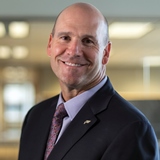
Over the last 40 years, Expeditors International has created a culture that is very important to its success and growth as an organization. According to Jeff Musser, president & CEO, there are nine characteristics that make up its culture, including curiosity, pride, appearance, visionary, attitude, integrity, excellence, resolute, and a sense of humor. These traits are so important to the company that when new employees are brought onboard, time is spent explaining to them the culture at Expeditors and what these traits mean. “Because without understanding, they’re just simply words,” he said.
Musser has increasingly noticed that, in the current environment where many people attempt to cause disruption, new employees hired into the company want to immediately change the culture. They don’t take the time to find out the history behind how the culture was created and why it is so important to the company. As an example, Musser pointed out that one of the longstanding culture traits that many new employees would like to change is the company dress code. Expeditors employees can often be identified by their “professional appearance.” Men are required to wear suits and ties to work; women must also dress up. Even next decision was whether to build or buy into it. In the end, buying Virgin America was identified as the best option. Virgin America owned about 60 planes and, similar to Alaska, had a loyal customer base and delivered award-winning service. Also enticing was the space Virgin America owned at the San Francisco airport and LAX. It had the geographic fit, the cultural fit, and the network opportunity. the IT department adheres to the same dress code. But there is a reason for this, explained Musser. In the early days, the movement of freight was a dirty business. People would walk from the warehouse into the office, trekking dirt across the floors; there would be stacks of paperwork everywhere. “We wanted a professional environment,” he said. “We wanted our offices to look professional, we wanted our people to look professional.” And that mindset has paid off. Customers have often said they chose Expeditors because it looks like a professional company.
ALUMNI PROFILE: TIFFANY ASH
BUILDING A GOOD FOUNDATION AT ALBERS
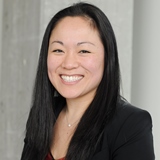
Tiffany Ash (’02 BABA in Accounting) took an accounting path to get to her current position as Vice President of Operations, with team members in the U.S., Europe, and Asia, at Tableau Software. Although she knew in high school that she wanted to major in accounting, she later realized that getting a CPA license wasn’t in the cards for her. During summers, she worked in accounting internships at Boeing that were geared toward controllership and Ash appreciates the foundation that accounting provided. “Accounting is a solid starting point for understanding business and the way things work. I’m forever grateful for understanding a balance sheet, income statement, and debits and credits,” she said.
Seattle University provided Ash a business education that exceeded her expectations. At first, she struggled with the university core classes. She was anxious to dive into the “meat” of her business degree. However, she came to understand that the core classes were a necessary part of a well-rounded education and she is quick to describe many lessons that she has brought with her throughout her career, from her Jesuit education. Once she started taking classes at Albers, Ash really enjoyed school. “The professors were amazing,” she said. “I loved working with them, learning from them. I had my most memorable experiences with Sarah Bee, Susan Weihrich, Dave Tinius, and many others throughout Albers! Our professors brought a breadth of knowledge, experience, and personality into the classroom. It was like learning through real life and not just books and lectures.”
During her first year at Seattle U, Ash was on the crew team. “Besides being a mother (now), crew was the hardest thing I’ve ever done,” she said. It was physically and emotionally challenging. Although crew was a wonderful experience, Ash decided she wanted to experience more of “the college schedule,” which would include getting out of bed later than 5 a.m., six days a week. She did prison ministry through Campus Ministry, joined the inaugural year of the SU Dance Team, and participated in an exploration of self at a SEARCH retreat. She later joined Beta Alpha Psi (an accounting fraternity), serving as its president her senior year, and Alpha Kappa Psi.
After graduation, Ash joined PricewaterhouseCoopers (PwC) as an auditor. She liked the dynamic of working with different clients and teams, in different industries and cities. She developed relationships that she’s extremely grateful for and keeps in touch with many who she met during her time at PwC. She discovered, though, that auditing was not her passion. She said farewell to PwC after an internship and a couple of busy seasons (although now questions why we call it busy season when it was always busy!). She joined aQuantive (now part of Microsoft) as a revenue accountant for nine months. At this point, needing a different challenge and at a time in her life when she felt she could take a risk, Ash moved to INROADS, a nonprofit that matches companies with underrepresented business and engineering students for paid internships. Less than two years later, a good friend of Ash’s (from PwC) recommended she look into a job opportunity at Tableau. She was so impressed with the people, product, and company that “I jumped onboard without hesitation, and here I am,” she said. Her goal was to make the five-year mark. That was in December of 2006.
Ash joined Tableau as an accounting manager, but because it was still in start-up mode, she wore many hats. She was responsible for collecting cash, paying bills, financial reporting, payroll, sales compensation, equity, fulfilling orders during busy times, and contract negotiations, as well as HR functions, employee onboarding, recruiting, and helped hire positions in order to create new key functions. Ash later evolved into a business operations role, which included projects to help grow the business globally. She loves being in the tech world, with its fast paced, rapidly innovating, and creative environment. One of the many lessons Ash has learned over the past decade and a half is to continuously evaluate what you want, go after it, and be confident in yourself and your path, regardless of how often the course might change.
FACULTY PROFILE: GENEVA LASPROGATA
INNOVATING CREATIVE TEACHING
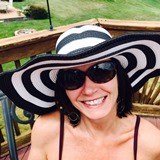
Eva Lasprogata, associate professor of business law, has spent her professional life experiencing and promoting change through teaching and her work with social justice projects. Having been educated in Catholic all-girls schools through high school, Lasprogata had not seen a boy in class until her freshman year at Boston College. She had no idea that discrimination against women existed. A whole new world opened up to her when she started taking classes in women’s studies. “I went from a middle class, white, protected, secure life to reality,” she said. She became obsessed with women’s issues and social justice, joining campus groups that dealt with them. Eventually, this obsession led her to law school. She saw it as a way of addressing these issues. “No one listens to me; I’m going to law school!” was how Lasprogata explained her decision.
After graduating from Villanova University with a law degree, Lasprogata went on to get her Master of Laws (LLM) degree from New York University, where she took the international law track because of her interest in human rights. She was practicing law in Philadelphia, where she grew up, when she decided she wanted to live in a “more liberally-minded, progressive West coast environment.” Hearing about Seattle from friends, she packed up her car and cat and drove across the country to a new life. After taking the Washington bar exam, Lasprogata networked for six months before landing a job as a junior associate at the law firm of Heller Ehrmann White and McAuliffe (which no longer exists).
Lasprogata realized during her second year of law school that “being a teacher is my heart’s purpose.” In order to teach, however, she needed law experience. Her job at Heller Ehrmann gave her that. She started teaching as an adjunct at the University of Washington, but there were no openings there for tenure track positions. Through a mentor, she was guided to Jerry Viscione, dean of Albers at the time, and two years later, when a tenure track position at Albers opened up, she was hired. That was in 1999. She’s been here ever since. “I enjoy the creativity in teaching, designing the class, deciding what I am going to teach, and how I am going to teach it,” she said.
Lasprogata teaches business law, negotiations, international business law, and data analytics law at both the undergraduate and graduate levels. Her scholarship centers around entrepreneurship and technology and how they sometimes cross over into social justice. Through her appointment as the Robert D. O’Brien Chair, Lasprogata is working to integrate liberal arts more deeply into Albers’ undergraduate business core curriculum. She piloted some of the coursework in her business law class this past academic year.
In addition to teaching at Albers and being an involved mom to three teenage boys, Lasprogata is also very active in yoga and is trained as a yoga instructor. She credits her yoga teacher training with helping her find herself so she could be a better teacher overall. “It wasn’t about yoga so much as self-awareness,” she said. “How you show up, how you know yourself, how you communicate, how you are present.”
For those who are a bit confused about her name, Lasprogata legally changed her first name three years ago from Gail to Geneva, Eva for short. She had never felt comfortable with the name Gail and its legacy was one which she wanted to put in her past. After deep consideration and brainstorming with friends, Geneva was born. It took a while to own her new name, but she is now happily Geneva Anne Lasprogata.
HAPPENING AT ALBERS

ALBERS EXECUTIVE SPEAKER SERIES
Events are held in Pigott Auditorium from 5:30-6:30 p.m. (unless otherwise noted) Free and open to the public.
Scott & Ally Svenson
Co-founders, Mod Pizza
Wednesday, October 11, 2017
Nick Hanauer
Entrepreneur, Venture Capitalist, Civic Activist, Philanthropist
Tuesday, November 7, 2017
Diversity & Inclusion Panel
Latasha Gillespie, Global Diversity & Inclusion Director, Amazon
Denise Merle, SVP of Human Resources & Investor Relations, Weyerhaeuser
Karen Wilkins-Mickey, Director of Diversity & Inclusion, Alaska Airlines
Wednesday, January 10, 2018
5:30 - 6:45 p.m.
Bryan Mistele
CEO, INRIX
Thursday, February 1, 2018
ALBERS CAREER CENTER EVENTS
Albers Mentor Fair
Friday, October 6, 2017
6 - 8 p.m.
PACCAR Atrium, Pigott Building
Kick-off event for the Albers Mentor Program.
Business & Engineering Career Fair
Tuesday, October 17, 2017
11 a.m. - 2 p.m.
Campion Ballroom
Alumni are welcome to attend all campus career fairs to connect and engage with employers.
Internship Fair
Tuesday, February 6, 2018
11 a.m. - 2 p.m.
Campion Ballroom
Albers Career Night
Tuesday, February 27, 2018
6 - 7:30 p.m.
Optimism Brewery, Capitol Hill
Networking reception for undergrads to connect with employers and Albers alumni.
More info on these events or need help with career advising? Contact the Albers Career Center at 206-296-5687 or apc@seattleu.edu.
OTHER EVENTS
Stoking the Common Fire 2017: 20 Years of Excellence in Leadership
For alumni and students of the Executive Leadership Program and Leadership Executive MBA at the Albers School of Business and Economics.
Featuring Alan Mulally, CLF Senior Fellow and David Whyte, Poet & Speaker
Friday, September 29, 2017
12 - 6 p.m.
Silver Cloud Hotel
Saturday, September 30, 2017
8 a.m. - 5:30 p.m.
Student Center
Contact Ariel Rosemond at rosemond@seattleu.edu for more information.
Graduate Programs Information Sessions
We hold information sessions for our graduate programs two times a month. Visit our Graduate Information Sessions page for upcoming dates.
SAVE THE DATE!
Economic Forecast Breakfast
January 2018
Watch your mailbox for more details soon.
Albers Crab Feed
Friday, March 16, 2018
(Notice it’s on Friday this year!)